|
Books Should Be Free Loyal Books Free Public Domain Audiobooks & eBook Downloads |
|
|
Books Should Be Free Loyal Books Free Public Domain Audiobooks & eBook Downloads |
|
Essay/Short Nonfiction |
|---|
|
Book type:
Sort by:
View by:
|
By: Charles Dudley Warner (1829-1900) | |
|---|---|
 Diversities of American Life
Diversities of American Life
| |
 Equality
Equality
| |
 Indeterminate Sentence
Indeterminate Sentence
| |
 Thoughts Suggested by Mr. Foude's "Progress"
Thoughts Suggested by Mr. Foude's "Progress"
| |
 Pilgrim and American
Pilgrim and American
| |
By: Charles James Lever (1806-1872) | |
|---|---|
 Cornelius O'Dowd Upon Men And Women And Other Things In General
Cornelius O'Dowd Upon Men And Women And Other Things In General
| |
By: Charles Kingsley (1819-1875) | |
|---|---|
 Sanitary and Social Lectures, etc
Sanitary and Social Lectures, etc
| |
By: Charles Mackay (1814-1889) | |
|---|---|
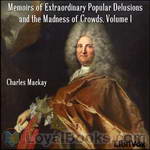 Memoirs of Extraordinary Popular Delusions and the Madness of Crowds
Memoirs of Extraordinary Popular Delusions and the Madness of Crowds
The book chronicles and vilifies its targets in three parts: “National Delusions”, “Peculiar Follies”, and “Philosophical Delusions”.The subjects of Mackay’s debunking include alchemy, beards (influence of politics and religion on), witch-hunts, crusades and duels. Present day writers on economics, such as Andrew Tobias, laud the three chapters on economic bubbles. | |
By: Charles MacLaurin (1872-1925) | |
|---|---|
 Post Mortem: Essays, Historical And Medical
Post Mortem: Essays, Historical And Medical
This 1922 collection of extensive essays comprises well written biographies of a few famous folk. The life narratives include analyses of medical and/or psychological elements in each person’s life. Biographies include Anne Boleyn, Jeanne D’Arc, The Empress Theodora, The Emperor Charles V, Don John Of Austria, Cervantes, Don Quixote , Philip II, Mr. and Mrs. Pepys, Edward Gibbon, Jean Paul Marat, Napoleon I, and Benvenuto Cellini. It concludes with an extended meditation on death. “But there... | |
By: Charles McRae | |
|---|---|
 Fathers of Biology
Fathers of Biology
An account given of the lives of five great naturalists (Hippocrates, Aristotle, Galen, Vesalius and Harvey) will not be found devoid of interest. The work of each one of them marked a definite advance in the science of Biology. There is often among students of anatomy and physiology a tendency to imagine that the facts with which they are now being made familiar have all been established by recent observation and experiment. But even the slight knowledge of the history of Biology, which may be obtained from a perusal of this little book, will show that, so far from such being the case, this branch of science is of venerable antiquity... | |
By: Charles S. (Charles Stephen) Brooks (1878-1934) | |
|---|---|
 Chimney-Pot Papers
Chimney-Pot Papers
| |
 There's Pippins and Cheese to Come
There's Pippins and Cheese to Come
| |
By: Charles W. Diffin (1884-1966) | |
|---|---|
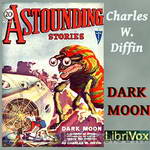 Dark Moon
Dark Moon
Mysterious, dark, out of the unknown deep comes a new satellite to lure three courageous Earthlings on to strange adventures. | |
By: Charles Willard Diffin (1884-1966) | |
|---|---|
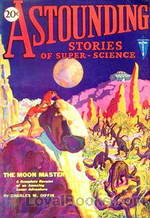 Moon Master
Moon Master
Through Infinite Deeps of Space Jerry Foster Hurtles to the Moon—Only to be Trapped by a Barbaric Race and Offered as a Living Sacrifice to Oong, their Loathsome, Hypnotic God. | |
By: Charles William Eliot (1834-1926) | |
|---|---|
 Harvard Classics Volume 28 Essays English and American
Harvard Classics Volume 28 Essays English and American
| |
By: Charlotte Perkins Gilman (1860-1935) | |
|---|---|
 The Forerunner, Volume 1 (1909-1910)
The Forerunner, Volume 1 (1909-1910)
| |
By: Chesterton, G. K. | |
|---|---|
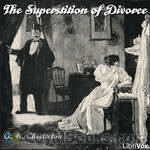 The Superstition of Divorce
The Superstition of Divorce
This short book was written in 1920, and in it Chesterton, with his usual wit and incisive logic, presents a series of articles defending marriage and indicating the weaknesses in divorce. He did this 16 year before the first Christian denomination in the world allowed it’s members to divorce. Till then Christendom was unanimous in standing against it. Chesterton saw clearly the trends of this time, and delivered this defense. | |
By: Christopher Morley (1890-1957) | |
|---|---|
 Mince Pie
Mince Pie
Mince Pie is a compilation of humorous sketches, poetry, and essays written by Christopher Morley. Morley sets the tone in the preface: "If one asks what excuse there can be for prolonging the existence of these trifles, my answer is that there is no excuse. But a copy on the bedside shelf may possibly pave the way to easy slumber. Only a mind "debauched by learning" (in Doctor Johnson's phrase) will scrutinize them too anxiously." | |
 Pipefuls
Pipefuls
A delightful collection of 48 essays on various topics of the human condition that caught his fancy. Witty, insightful and funny of course and on occasion thought provoking and even disturbing. From the preface "These sketches gave me pain to write; they will give the judicious patron pain to read; therefore we are quits. I think, as I look over their slattern paragraphs, of that most tragic hour—it falls about 4 p. m. in the office of an evening newspaper—when the unhappy compiler tries to round up the broodings of the day and still get home in time for supper... | |
 Religio Journalistici
Religio Journalistici
The great Canadian journalist and humorist ruminates and reflects upon his life and calling in this 1924 little gem. - Summary by david wales | |
 Shandygaff
Shandygaff
A number of most agreeable Inquirendoes upon Life & Letters, interspersed with Short Stories & Skits, the whole most Diverting to the Reader. SHANDYGAFF: a very refreshing drink, being a mixture of bitter ale or beer and ginger-beer, commonly drunk by the lower classes in England, and by strolling tinkers, low church parsons, newspaper men, journalists, and prizefighters. Said to have been invented by Henry VIII as a solace for his matrimonial difficulties. It is believed that a continual bibbing of shandygaff saps the will, the nerves, the resolution, and the finer faculties, but there are those who will abide no other tipple... | |
 Modern Essays
Modern Essays
Thirty three essays by more or less well-known authors of Britain, the United States, and Canada, each fronted by an introductory paragraph. Early twentieth or late nineteenth centuries. “I think I can offer you, in this parliament of philomaths [lover of learning], entertainment of the most genuine sort;…as brilliant and sincere work is being done to-day in the essay as in any period of our literature. Accordingly the pieces reprinted here are very diverse. There is the grand manner; there is foolery; there is straightforward literary criticism; there is pathos, politics, and the picturesque... | |
By: Clarence Darrow (1857-1938) | |
|---|---|
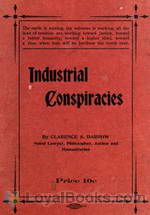 Industrial Conspiracies
Industrial Conspiracies
| |
By: Clayton Hamilton (1881-1946) | |
|---|---|
 Problems of the Playwright
Problems of the Playwright
A third volume of essays by American critic Clayton Hamilton, published as a companion piece to The Theory of the Theatre & Studies in Stagecraft, and focusing on the problems of the playwright. | |
 Studies in Stagecraft
Studies in Stagecraft
A companion piece to Hamilton's earlier work, The Theory of the Theatre. Where that volume dealt with the criticism of dramatic art in general, this volume focuses more specifically on the contemporary drama of the era in which it was written. - Summary by Andrew Gaunce | |
By: Coningsby Dawson (1883-1959) | |
|---|---|
 It Might Have Happened to You
It Might Have Happened to You
This is a frank eyewitness description of the suffering, starvation in particular, that was widely experienced in Central and Eastern Europe in the aftermath of "The Great War". “It is not stating matters too strongly to say that…peace had caused at least as much misery as the four years’ fury of embattled armies.” It is a powerful political and anti-war statement with scant mention of any battle. – Lee Smalley | |
By: D. B. Casteel (1877-1958) | |
|---|---|
 Behavior of the Honey Bee in Pollen Collecting
Behavior of the Honey Bee in Pollen Collecting
The value of the honey bee in cross pollinating the flowers of fruit trees makes it desirable that exact information be available concerning the actions of the bee when gathering and manipulating the pollen. The results recorded in this manuscript are also of value as studies in the behavior of the bee and will prove interesting and valuable to the bee keeper. The work here recorded was done by Dr. Casteel during the summers of 1911 and 1912. | |
By: Dame Shirley (d.1906) | |
|---|---|
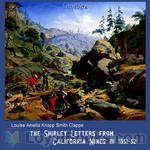 The Shirley Letters from California Mines in 1851-52
The Shirley Letters from California Mines in 1851-52
Louise Amelia Knapp Smith Clappe moved to California from Massachusetts during the Gold Rush of the mid-1800’s. During her travels, Louise was offered the opportunity to write for The Herald about her travel adventures. It was at this point that Louise chose the name “Shirley” as her pen name. Dame Shirley wrote a series of 23 letters to her sister Mary Jane (also known as Molly) in Massachusetts in 1851 and 1852. The “Shirley Letters”, as the collected whole later became known, gave true accounts of life in two gold mining camps on the Feather River in the 1850s... | |
By: Daniel Defoe (1661?-1731) | |
|---|---|
 Everybody's Business Is Nobody's Business
Everybody's Business Is Nobody's Business
| |
By: Dante Alighieri (1265-1321) | |
|---|---|
 Vulgari Eloquentia
Vulgari Eloquentia
De vulgari eloquentia (On Eloquence in the vernacular) is a short essay written by Dante Alighieri in Latin. The work remains incomplete; only one and a half books are extant. It is believed to have been composed during Dante's exile, probably at some point between 1302 and 1305. The work revolves around the relationship between Latin and vernacular, and the need for a literary language, with an excourse on the poetic forms in vernacular. | |
By: David Hilbert (1862-1943) | |
|---|---|
 Mathematical Problems
Mathematical Problems
Lecture delivered before the International Congress of Mathematicians at Paris in 1900 and subsequently published in the Bulletin of the American Mathematical Society Vol. 8 (1902), 479-481. | |
By: Douglas Fairbanks (1883-1939) | |
|---|---|
 Laugh and Live
Laugh and Live
Douglas Fairbanks, Sr. (May 23, 1883 – December 12, 1939) was an American actor, screenwriter, director and producer. He was best known for his swashbuckling roles in silent films such as The Thief of Baghdad, Robin Hood, and The Mark of Zorro. His book, Laugh and Live, is a book about positive virtues and advice for leading a good, healthy, and successful life. An advisory about this book is in order. Published in 1917, it was written at a time when “men went to work, women kept house, and supported their man”... | |
By: Dr. Benjamin Rush (1746-1813) | |
|---|---|
 Inquiry into the Effects of Ardent Spirits upon the Human Body and Mind, with an Account of the Means of Preventing, and of the Remedies for Curing Them
Inquiry into the Effects of Ardent Spirits upon the Human Body and Mind, with an Account of the Means of Preventing, and of the Remedies for Curing Them
Written when the United States extended only to the Mississippi River, by one of the signers of the Declaration of Independence, this short work explores the physical, social, and mental effects of distilled liquors; the classes of people prone to intoxication by them; suggested drinks to use instead of them; and remedies for intoxication and for their habitual use. He takes a medical view of alcoholism, exploring the physical causes rather than blaming moral failure as the cause. Alcoholic drinks that are not distilled are viewed as wholesome drinks, and opium is suggested for pain as being without bad effects or addictive qualities. | |
By: Dreiser, Theodore (1871-1945) | |
|---|---|
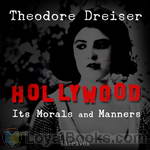 Hollywood: Its Morals and Manners
Hollywood: Its Morals and Manners
Serialized in Shadowland from November 1921 to February 1922, Hollywood: Its Morals and Manners is Theodore Dreiser's shocking four part expose on the motion picture industry. In it, he shares his observations from his extended stay in Los Angeles, and gives us an intimate look at the seedier underside of Hollywood. | |
By: E. Walter Walters | |
|---|---|
 Confessions of a Book-Lover
Confessions of a Book-Lover
"I am of the company of book men who read simply for the love of it," confesses E. Walter Walters, in this gently written tome. Walters documents his habit of "book fishing--" seeking and finding quality volumes in the discount binds at his booksellers, and as a connoisseur of wine might match varieties with courses, he matches his books with the contexts in which he reads them--in the garden, in the bedroom, with friends. He also provides a list of his favorite authors and favorite books, as well as favorite characters from the books he has read, not in a way to impose his choices on other readers, but to share his own personal experiences. | |
By: editor: Frank Munsey | |
|---|---|
 The Scrap Book Sampler
The Scrap Book Sampler
18 works -- two non-fic articles & one short fiction or poetry each -- from issues March, April, May, June, July, & August 1906 of The Scrap Book, Volume 1, edited by Frank Munsey. As he states in the editorial of the April 1906 issue (Vol 1, Iss 2) this was a sort of supplement to the editor's popular monthly, Munsey's Magazine. The Scrap Book is very like an American version of Punch with many short, often humorous articles interspersed with at least one short story, some poetry, and several longer non-fic pieces. The Scrap Book ran up to 1922. | |
By: Edmund Burke (1729-1797) | |
|---|---|
 Selections from the Speeches and Writings of Edmund Burke
Selections from the Speeches and Writings of Edmund Burke
| |
By: Edmund Gosse | |
|---|---|
 Gossip in a Library
Gossip in a Library
A collection of informal essays about books in his library. He combines commentary, translations, and humorous asides about authors and their subjects. | |
By: Edward Carpenter (1844-1929) | |
|---|---|
 Homogenic Love and Its Place in a Free Society
Homogenic Love and Its Place in a Free Society
This pamphlet by LGBT pioneer and philosopher Edward Carpenter was originally intended to form part of his work "Love's Coming of Age", but was removed following public discourse on the Oscar Wilde trials of 1895. It was subsequently published privately and circulated among his inner circle. This is Carpenter's first publication on the subject of homosexuality, and displays his typical forward-thinking and utopian sentiments. It seeks to make clear that homosexuality is innate, is more widespread than generally accepted, and even implies that degress of bisexuality may be universal. - Summary by Jake Malizia | |
By: Edward Ziegler Davis (1878-1924) | |
|---|---|
 Translations of German Poetry in American Magazines 1741-1810
Translations of German Poetry in American Magazines 1741-1810
| |
By: Elbert Hubbard (1856-1915) | |
|---|---|
 Mintage
Mintage
Elbert Hubbard is best known as the author of the "Little Journeys To The Homes of Famous People". These 11 short stores show the side of him that celebrated caring, friendship love among humans. The first describes how 5 frightened orphan children from a foreign country were cared for on a railroad journey of a thousand miles; all by strangers without any planning and without a word of English being spoken or needed. He observed caring human men and women of all ages doing whatever was necessary to see they reached their destination in whatever comfort could be provided... | |
By: Elihu W. (Elihu Whittlesey) Baldwin (1789-1840) | |
|---|---|
 The National Preacher, Vol. 2 No. 7 Dec. 1827 Or Original Monthly Sermons from Living Ministers, Sermons XXVI. and XXVII.
The National Preacher, Vol. 2 No. 7 Dec. 1827 Or Original Monthly Sermons from Living Ministers, Sermons XXVI. and XXVII.
| |
By: Eliot Gregory (1854-1915) | |
|---|---|
 The Ways of Men
The Ways of Men
| |
 Worldly Ways and Byways
Worldly Ways and Byways
| |
By: Elisabeth Woodbridge Morris (1870-1964) | |
|---|---|
 More Jonathan Papers
More Jonathan Papers
| |
By: Emma Goldman (1869-1940) | |
|---|---|
 Anarchism and Other Essays
Anarchism and Other Essays
Chicago, May 4, 1886. In the Haymarket region of the city, a peaceful Labor Day demonstration suddenly turns into a riot. The police intervene to maintain peace, but they soon use violence to quell the mob and a bomb is thrown, resulting in death and injuries to scores of people. In the widely publicized trial that followed, eight anarchists were condemned to death or life imprisonment, convicted of conspiracy, though none of them had actually thrown the bomb. A young Russian immigrant, Emma Goldman, had arrived just the previous year in the United States... | |
By: Étienne de La Boétie (1530-1563) | |
|---|---|
 Anti-Dictator: The Discours sur la servitude voluntaire
Anti-Dictator: The Discours sur la servitude voluntaire
Étienne de La Boétie was the closest friend of Michel de Montaigne and the subject of the latter's famous essay "On Friendship." Here, however, he tackles a different, more impersonal relationship: that of ruler and ruled. The argument in this work is encapsulated in this quote: "A people enslaves itself, cuts its own throat, when, having a choice between being vassals and being free men, it deserts its liberties and takes on the yoke, gives consent to its own misery, or, rather, apparently welcomes it... | |
By: Eustace Budgell (1686-1737) | |
|---|---|
 The De Coverley Papers From 'The Spectator'
The De Coverley Papers From 'The Spectator'
| |
By: Eva March Tappan (1854-1930) | |
|---|---|
 World’s Story Volume II: India, Persia, Mesopotamia and Palestine
World’s Story Volume II: India, Persia, Mesopotamia and Palestine
This is the second volume of the 15-volume series of The World’s Story: a history of the World in story, song and art, edited by Eva March Tappan. Each book is a compilation of selections from prose literature, poetry and pictures and offers a comprehensive presentation of the world's history, art and culture, from the early times till the beginning of the 20th century. Topics in Part II include India, Siam, Afghanistan, Persia, Mesopotamia and Palestine. - Summary by Sonia Cast list for Sakoontala, or the lost ring: King: Tomas Peter First Attendant: Eva Davis Second Attendant: TJ Burns Child: lorda Sakoontala: Monika M... | |
 World’s Story Volume I: China, Japan and the Islands of the Pacific
World’s Story Volume I: China, Japan and the Islands of the Pacific
This is the first volume of the 15-volume series of The World’s Story: a history of the World in story, song and art, edited by Eva March Tappan. Each book is a compilation of selections from prose literature, poetry and pictures and offers a comprehensive presentation of the world's history, art and culture, from the early times till the beginning of the 20th century. Topics in Part I include China, Korea, Japan and the Islands of the Pacific. - Summary by Sonia Cast list for The Sorrows of... | |
By: Fanny Dickerson Bergen (1846-1924) | |
|---|---|
 Current Superstitions
Current Superstitions
No matter how enlightened, chances are you’ve been raised around superstitious lore of one kind or another. Fanny Dickerson Bergen was one of the original researchers of North American oral traditions relating to such key life events and experiences as babyhood and childhood, marriage, wishes and dreams, luck, warts and cures, death omens and mortuary customs, and “such truck,” as Huck Finn would say. You’ll be surprised at how many of these old saws you’ll know. Here’s a quote from... | |
By: Founding Fathers of the United States | |
|---|---|
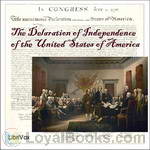 The Declaration of Independence of the United States of America
The Declaration of Independence of the United States of America
Declaration of Independence is the document in which the Thirteen Colonies declared themselves independent of the Kingdom of Great Britain and explained their justifications for doing so. It was ratified by the Continental Congress on July 4, 1776. | |
By: Francis Bacon (1561-1626) | |
|---|---|
 The Essays of Francis Bacon
The Essays of Francis Bacon
Among the many ideas explored in this book are beauty, gardens, honor and reputation, cunning, nobility, friendship and many others. Authored by the man who is credited with having invented the essay form in English, The Essays of Francis Bacon was written over an extended period, ranging from the mid sixteenth century. They were compiled in a single edition in 1597 and later re-written, enlarged and added to in other editions in 1612 and 1625. However, their compelling and insightful quality still appears fresh and appealing to modern day readers... | |
By: Francis Pharcellus Church (1839-1906) | |
|---|---|
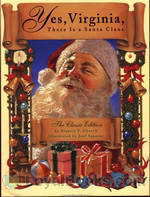 Yes, Virginia, There Is A Santa Claus
Yes, Virginia, There Is A Santa Claus
“Is There A Santa Claus?” was the headline that appeared over an editorial in the September 21, 1897 edition of the New York Sun. The editorial, which included the response of “Yes, Virginia, There is a Santa Claus,” has become an indelible part of popular Christmas lore in the United States. | |
By: Frank Gelett Burgess (1886-1951) | |
|---|---|
 Romance Of The Commonplace
Romance Of The Commonplace
Thirty four whimsical, tongue-in-cheek, and entertaining essays about not much in particular, published in 1902, by one of the most popular writers of the late nineteenth and early twentieth centuries. The American Gelett Burgess was an artist, art critic, poet, author, and humorist. Nonsense verse was a specialty. - Summary by David Wales | |
By: Frank W. Boreham (1871-1959) | |
|---|---|
 Silver Shadow, and Other Day Dreams
Silver Shadow, and Other Day Dreams
Frank Boreham was a well known preacher who served in England, Australia, and New Zealand. He published dozens of books and thousands of editorials during his lifetime, with no sign of slowing down, even up until his death at age 88. He wrote with a distinctive style, seeming to be able to draw a spiritual lesson out of any conceivable topic. Boreham admits that this volume is but a collection of his reflections on things. But he hopes that by viewing the reflections, we will be more apt to take notice of the things themselves than if we had looked directly at them in full light of day. - Summary by Devorah Allen | |
By: Friedrich Kerst | |
|---|---|
 Mozart, The Man and the Artist as Revealed in His Own Words
Mozart, The Man and the Artist as Revealed in His Own Words
Wolfgang Amadeus Mozart. His name is one of the most recognizable names in history and one of the most enduring of composers. At age 5, this “wunderkinder” took to the stage and began his life as a prolific and celebrated creator-genius of such luminous works the world has not known since. This collection of morsels taken from his personal letters is engaging and gives a look into the mind of the boy wonder. Was he mad? Was he miraculous? | |
By: Friedrich Nietzsche (1844-1900) | |
|---|---|
 Case of Wagner / Nietzsche Contra Wagner / Selected Aphorisms
Case of Wagner / Nietzsche Contra Wagner / Selected Aphorisms
A collection of three of Nietzsche's writings concerning the music of Wagner. In particular, he relates Wagner's music as degenerate, unrefined and unintelligent and relates it to a gradually degenerating German culture and society. The translator provides a detailed introduction. | |
 Complete Works of Friedrich Nietzsche: Volume 3
Complete Works of Friedrich Nietzsche: Volume 3
Volume 3 of the complete works contains several short critical introductory essays, five lectures under the heading "On the Future of our Educational Institutions," and finally an essay by the author entitled "Homer and Classical Philology." As always, Nietzsche believes in the importance of classical thought. | |
By: Friedrich von Hügel (1852-1925) | |
|---|---|
 Essays and Addresses on the Philosophy of Religion
Essays and Addresses on the Philosophy of Religion
Baron Friedrich von Hugel was a lay Catholic theologian whose work was influential during the rise of modernist thought. His Essays and Addresses on the Philosophy of Religion became a favorite work of later Christian writers C.S. Lewis and Flannery O'Connor. The book compiled previously written material into a single collection, divided into three parts: the first, on religion and theism in general; the second, on Christ's teachings and Christianity in general; the third, on the Catholic Church. - Summary by Dylan P. Straub | |
By: G. K. Chesterton | |
|---|---|
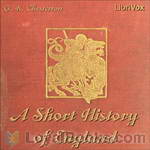 A Short History of England
A Short History of England
Gilbert Keith Chesterton was a prolific writer on many topics. His views of history were always from the standpoint of men and their interactions, and it may fairly be said he saw all of history as a battle between civilization and barbarism. So it has always been, and that remains true even today.“But it is especially in the matter of the Middle Ages that the popular histories trample upon the popular traditions. In this respect there is an almost comic contrast between the general information... | |
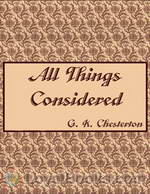 All Things Considered
All Things Considered
Another delightful and sharply pointed excursion into the topics of the day, and of this day as well, with Gilbert Keith Chesterton. These reprinted magazine articles are filled with his good natured wit, his masterful use of paradox, and devastating ability to use reductio ad absurdum to destroy the popular myths that drive a society driving full-speed into secular humanism. You will come away with a whole new collection of wonderful quotes. (Ray Clare) | |
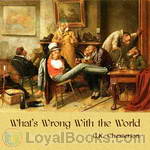 What's Wrong With the World
What's Wrong With the World
Gilbert Keith Chesterton (1874–1936) has been called the “prince of paradox.” Time magazine observed of his writing style: “Whenever possible Chesterton made his points with popular sayings, proverbs, allegories—first carefully turning them inside out.” His prolific and diverse output included journalism, philosophy, poetry, biography, Christian apologetics, fantasy and detective fiction. The title of Chesteron’s 1910 collection of essays was inspired by a title given to him two years earlier by The Times newspaper, which had asked a number of authors to write on the topic: “What’s wrong with the world?”... | |
 Eugenics and Other Evils
Eugenics and Other Evils
Most Eugenists are Euphemists. I mean merely that short words startle them, while long words soothe them. And they are utterly incapable of translating the one into the other, however obviously they mean the same thing. Say to them “The persuasive and even coercive powers of the citizen should enable him to make sure that the burden of longevity in the previous generation does not become disproportionate and intolerable, especially to the females”; say this to them and they will sway slightly to and fro like babies sent to sleep in cradles. Say to them “Murder your mother,” and they sit up quite suddenly. Yet the two sentences, in cold logic, are exactly the same.” | |
 Miscellaneous Essays
Miscellaneous Essays
These nine files are miscellaneous short essays or stories from G. K. Chesterton. They were chosen for not only their brevity but also for being shining exemplars of Chesterton’s wit and whimsy. A fun but powerful introduction into the mind of the man that is G. K. Chesterton. | |
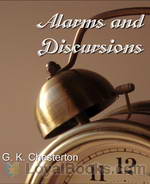 Alarms and Discursions
Alarms and Discursions
Gilbert Keith Chesterton was an influential English writer of the early 20th century. His prolific and diverse output included journalism, philosophy, poetry, biography, Christian apologetics, fantasy, and detective fiction. Chesterton has been called the “prince of paradox.” He wrote in an off-hand, whimsical prose studded with startling formulations. Chesterton wrote about 4000 essays on various subjects, and “Ararms and Discursions is one of his collections. | |
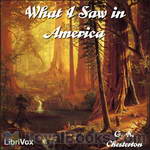 What I Saw in America
What I Saw in America
“Let me begin my American impressions with two impressions I had before I went to America. One was an incident and the other an idea; and when taken together they illustrate the attitude I mean. The first principle is that nobody should be ashamed of thinking a thing funny because it is foreign; the second is that he should be ashamed of thinking it wrong because it is funny.” (Gilbert Keith Chesterton) | |
 The New Jerusalem
The New Jerusalem
“On the road to Cairo one may see twenty groups exactly like that of the Holy Family in the pictures of the Flight into Egypt; with only one difference. The man is riding on the ass.” “The real mistake of the Muslims is something much more modern in its application than any particular passing persecution of Christians as such. It lay in the very fact that they did think they had a simpler and saner sort of Christianity, as do many modern Christians. They thought it could be made universal merely by being made uninteresting... | |
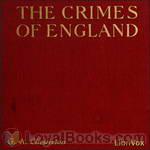 The Crimes of England
The Crimes of England
“Second, when telling such lies as may seem necessary to your international standing, do not tell the lies to the people who know the truth. Do not tell the Eskimos that snow is bright green; nor tell the negroes in Africa that the sun never shines in that Dark Continent. Rather tell the Eskimos that the sun never shines in Africa; and then, turning to the tropical Africans, see if they will believe that snow is green. Similarly, the course indicated for you is to slander the Russians to the English and the English to the Russians; and there are hundreds of good old reliable slanders which can still be used against both of them... | |
 The Defendant
The Defendant
A collection of reprinted articles on a wide-range of subject, all in the unique style of G. K. Chesterton. Using wit, paradox, and good humor he “defends” a series of seeming harmless things that need no defense, and in so doing he exposes many of the broken assumptions and dogmatic notions of secular humanism and other trends of his age and of ours. | |
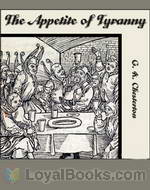 The Appetite of Tyranny
The Appetite of Tyranny
“Unless we are all mad, there is at the back of the most bewildering business a story: and if we are all mad, there is no such thing as madness. If I set a house on fire, it is quite true that I may illuminate many other people’s weaknesses as well as my own. It may be that the master of the house was burned because he was drunk; it may be that the mistress of the house was burned because she was stingy, and perished arguing about the expense of the fire-escape. It is, nevertheless, broadly true that they both were burned because I set fire to their house. That is the story of the thing. The mere facts of the story about the present European conflagration are quite as easy to tell.” | |
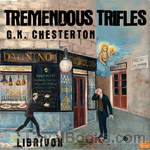 Tremendous Trifles
Tremendous Trifles
“None of us think enough of these things on which the eye rests. But don’t let us let the eye rest. Why should the eye be so lazy? Let us exercise the eye until it learns to see startling facts that run across the landscape as plain as a painted fence. Let us be ocular athletes. Let us learn to write essays on a stray cat or a coloured cloud. I have attempted some such thing in what follows; but anyone else may do it better, if anyone else will only try. ” (Gilbert Keith Chesterton) | |
 Varied Types
Varied Types
Another delightful and sharply pointed excursion into the topics of the day, and of our day as well, with Gilbert Keith Chesterton. Here he uses his wit and mastery of paradox to bring into focus a number of historical persons who in many ways typify the people who presently shape our world and who in their own right have already shaped Western civilization. These reprinted magazine articles are filled with his good natured wit and devastating ability to use reductio ad absurdum to destroy the popular myths that drive our society at full-speed into, and expose the utter nonsense that underlies, secular humanism. You will come away with yet another new collection of wonderful quotes. | |
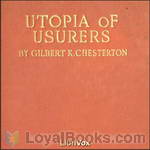 A Utopia of Usurers
A Utopia of Usurers
“Now I have said again and again (and I shall continue to say again and again on all the most inappropriate occasions) that we must hit Capitalism, and hit it hard, for the plain and definite reason that it is growing stronger. Most of the excuses which serve the capitalists as masks are, of course, the excuses of hypocrites. They lie when they claim philanthropy; they no more feel any particular love of men than Albu felt an affection for Chinamen. They lie when they say they have reached their position through their own organising ability... | |
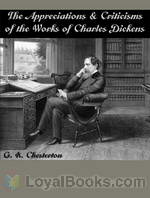 The Appreciations and Criticisms of the Works of Charles Dickens
The Appreciations and Criticisms of the Works of Charles Dickens
“These papers were originally published as prefaces to the separate books of Dickens in one of the most extensive of those cheap libraries of the classics which are one of the real improvements of recent times. Thus they were harmless, being diluted by, or rather drowned in Dickens. My scrap of theory was a mere dry biscuit to be taken with the grand tawny port of great English comedy; and by most people it was not taken at all–like the biscuit. Nevertheless the essays were not in intention so aimless as they appear in fact... | |
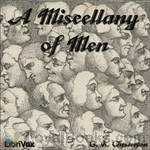 A Miscellany of Men
A Miscellany of Men
Gilbert Keith Chesterton was among the world’s most prolific writers who incorporated relentless logic, wonderful humor, and a clear view of truth into an amazing tool for exposing the foolishness of the policies of the world around him through the device of paradox.It is always great fun, and certainly always a learning experience to read Chesterton. A Miscellany of Men may be his hardest work to define, as it deals with a huge array of issues, using “personal types” as illustration. It would... | |
 Irish Impressions
Irish Impressions
“For the Irish Question has never been discussed in England. Men have discussed Home Rule; but those who advocated it most warmly, and as I think wisely, did not even know what the Irish meant by Home. Men have talked about Unionism; but they have never even dared to propose Union. A Unionist ought to mean a man who is not even conscious of the boundary of the two countries; who can walk across the frontier of fairyland, and not even notice the walking haystack. As a fact, the Unionist always shoots at the haystack; though he never hits it... | |
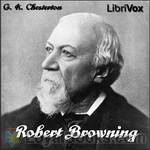 Robert Browning
Robert Browning
There is an old anecdote, probably apocryphal, which describes how a feminine admirer wrote to Browning asking him for the meaning of one of his darker poems, and received the following reply: “When that poem was written, two people knew what it meant–God and Robert Browning. And now God only knows what it means. | |
 Lord Kitchener
Lord Kitchener
“The paradox of all this part of his life lies in this–that, destined as he was to be the greatest enemy of Mahomedanism, he was quite exceptionally a friend of Mahomedans.” | |
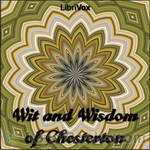 Wit and Wisdom of Chesterton
Wit and Wisdom of Chesterton
In this collection, Bevis Hillier has put together some of Chesterton's essays in "The Defandant", "Varied Types" and "Tremendous Trifles". These 12 pieces were chosen to giving a peek into the margins of Chesterton's work and give a sense of the distinctive flavor of his mind. They were also chosen with an eye to showing what a complex and fascinating character he was. | |
 G. K. Chesterton's Newspaper Columns: The New Witness - 1921
G. K. Chesterton's Newspaper Columns: The New Witness - 1921
A collection of the newspaper columns/essays written by G.K. Chesterton for "The New Witness", under the heading "At the Sign of the World's End". This project compiles the articles from 1921 | |
 Uses of Diversity
Uses of Diversity
A collection of 35 essays by G.K. Chesterton originally published in his weekly columns in "The Illustrated London News" and the "New Witness". The subjects vary greatly from lamp posts to Jane Austen's Emma, from "On Pigs as Pets" to Mormonism and Christian Science. | |
 Fancies Versus Fads
Fancies Versus Fads
A Collection of 31 essays from G.K. Chesterton. “I have strung these things together on a slight enough thread; but as the things themselves are slight, it is possible that the thread may manage to hang together. These notes range over very variegated topics and in many cases were made at very different times. They concern all sorts of things from lady barristers to cave-men, and from psycho-analysis to free verse. Yet they have this amount of unity in their wandering, that they all imply that it is only a more traditional spirit that is truly able to wander.” | |
 G.K. Chesterton's Newspaper Columns: The New Witness - 1922
G.K. Chesterton's Newspaper Columns: The New Witness - 1922
A collection of the newspaper columns/essays written by G.K. Chesterton for "The New Witness", under the heading "At the Sign of the World's End". This project compiles articles from 1922. | |
 Leo Tolstoy
Leo Tolstoy
Three men of letters give insightful essays on the work of Leo Tolstoy. | |
 Creed of a Credulous Person
Creed of a Credulous Person
A series of five essays by G.K. Chesterton, published in "Black and White" magazine in 1903, under the heading "The Creed of a Credulous Person". | |
 G.K. Chesterton in The Bibliophile Magazine
G.K. Chesterton in The Bibliophile Magazine
Two essays/articles by G.K. Chesterton, published in 'The Bibliophile' magazine in 1908. | |
 G.K. Chesterton in The Century Illustrated Magazine
G.K. Chesterton in The Century Illustrated Magazine
A collection of 5 articles/essays and 2 letters written by G.K. Chesterton in "The Century Illustrated Magazine". The pubilcation dates range from 1912-1923. | |
 G.K. Chesterton in America: A Catholic Review of the Week
G.K. Chesterton in America: A Catholic Review of the Week
A collection of 15 articles/essays written by G.K. Chesterton in "America: A Catholic Review of the Week". The publication dates range from 1915-1917. | |
 G.K. Chesterton in The Open Road
G.K. Chesterton in The Open Road
A collection of 2 book reviews written by G.K. Chesterton in "The Open Road", both from 1911. | |
 G.K. Chesterton in Vanity Fair Magazine
G.K. Chesterton in Vanity Fair Magazine
A collection of 12 articles/essays that G.K. Chesterton wrote for Vanity Fair magazine in 1920-1921, under the general title “The Next/New Renascence: Thoughts on the Structure of the Future.” | |
 G.K. Chesterton's Newspaper Columns: The New Witness - November 1919 to April 1920
G.K. Chesterton's Newspaper Columns: The New Witness - November 1919 to April 1920
A collection of the newspaper columns/essays written by G.K. Chesterton for "The New Witness", under the heading "At the Sign of the World's End". This project compiles the articles included in the issues between November 21, 1919 to April 30, 1920. | |
 G.K. Chesterton in The British Review
G.K. Chesterton in The British Review
Four articles/essays written by G.K. Chesterton for "The British Review". These were published in 1913 and 1914. | |
By: Gail Hamilton (1833-1896) | |
|---|---|
 Gala-days
Gala-days
| |
By: George Bernard Shaw (1856-1950) | |
|---|---|
 Quintessence of Ibsenism (Version 2)
Quintessence of Ibsenism (Version 2)
InThis is an essay providing an extended analysis of the works of Norwegian playwright Henrik Ibsen and of Ibsen's critical reception in England. Shaw uses this "exposition of Ibsenism" to illustrate the imperfections of British society, using the idea of an imaginary "community of a thousand persons," divided into three categories: Philistines, Idealists, and the lone Realist. The main discussion revolves around Ibsen's recurring topic of the strong character holding out against social hypocrisy, while stating in his essay's final sentence that the quintessence of Ibsenism is that "there is no formula." ( Michele Eaton) | |
By: George Henry Borrow (1803-1881) | |
|---|---|
 Letters of George Borrow to the British and Foreign Bible Society
Letters of George Borrow to the British and Foreign Bible Society
| |
By: George Meredith (1828-1909) | |
|---|---|
 Miscellaneous Prose
Miscellaneous Prose
| |
By: George Morang (1866-1937) | |
|---|---|
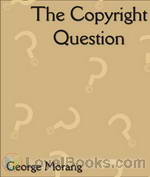 The Copyright Question
The Copyright Question
This is a letter to the Toronto Board of Trade regarding Canadian copyrights. Morang requested an appearance before the Toronto Board of Trade but was denied. This is his letter in response. He wished to make clear his position. | |
By: George Raffalovich (1880-1958) | |
|---|---|
 Ukraine
Ukraine
“We are not the same nation with Russian people,” the statement which all Ukrainians wish to convey to the whole world for centuries. The striving for freedom and independence is what these people shed much of their blood on Ukrainian lands for. “The Ukraine” by Bedwin Sands describes Ukrainian problem, which exacerbated in the late 19th and early 20th centuries, by looking back at the Ukrainian history, the development of Ukrainian literature and its influence, and by considering its relations with Austria and Russia. | |
By: George Washburn Smalley (1833-1916) | |
|---|---|
 Anglo-American Memories
Anglo-American Memories
“These Memories [1911] were written in the first instance for Americans and have appeared week by week each Sunday in the New York Tribune…. they are mainly concerned with men of exceptional mark and position in America and Europe whom I have met, and with events of which I had some personal knowledge. There is no attempt at a consecutive story.” Smalley was an American journalist born in Massachusetts in 1833; he wrote from and about many places in America and Europe. - Summary by Book Preface and David Wales | |